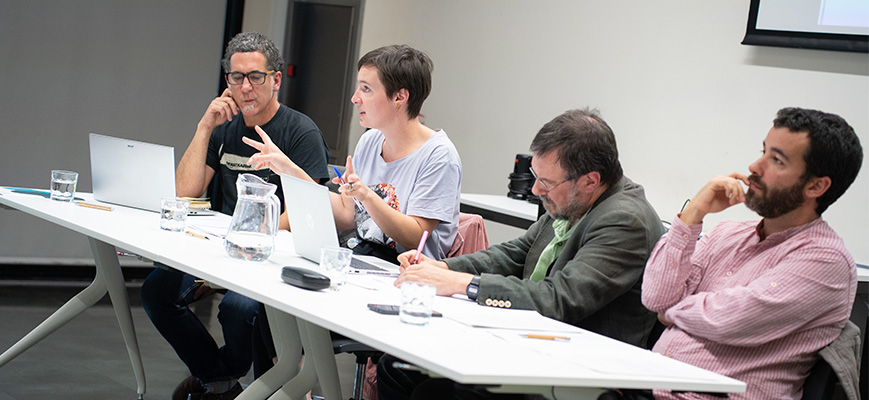Debate on the Basque conflict and its representation in culture on the Aretxabaleta campus
Debate on the Basque conflict and its representation in culture on the Aretxabaleta campus
Debate on the Basque conflict and its representation in culture on the Aretxabaleta campus
Writer and cultural agent Gotzon Barandiaran, bertsolari Oihana Iguaran, filmmaker Josu Martínez and writer Iban Zaldua participated in a round table entitled “Kontakizuna kontagai: Euskal gatazka kulturaren talaiatik” (“Telling the story: the Basque conflict from the vantage point of culture”). The event is one of various activities held under the Basque Government’s Plan for Coexistence, Human Rights and Diversity

Students on Mondragon University’s Communication campus in Aretxabaleta participated in a round table entitled “Kontakizuna kontagai: Euskal gatazka kulturaren talaiatik” (“Telling the story: the Basque conflict from the vantage point of culture”). Writer and cultural agent Gotzon Barandiaran, bertsolari Oihana Iguaran, filmmaker Josu Martínez and writer Iban Zaldua also took part in the event. journalist and Mondragon University professor Ane Zuazubiskar chaired the conference.
Round table
Writer and cultural agent Gotzon Barandiaran, bertsolari Oihana Iguaran, filmmaker Josu Martínez and writer Iban Zaldua participated in a round table entitled “Kontakizuna kontagai: Euskal gatazka kulturaren talaiatik” (“Telling the story: the Basque conflict from the vantage point of culture”). In a discussion moderated by journalist and faculty professor Ane Zuazubiskar, they reflected on how the Basque conflict has been represented in various cultural disciplines such as music, bertsolaritza, literature and film. The event was held as part of the Gizalegez agreement of the Basque Government’s Plan for Coexistence, Human Rights and Diversity, which aims to promote a culture of peace and prevent conflicts, human rights violations and any kind of violence.
Writer Iban Zaldua explained that, “in the case of literature, the first books in Basque and Spanish about the Basque conflict date from the same time period (the 1970s), but it is often said that there is almost nothing in Basque literature about the conflict.” According to Zaldua, literature in the 1980s passed through a “desert” and hardly any books were published about the conflict, in Basque or in Spanish, giving rise to the idea that the topic has not been addressed in literature from the Basque Country. However, explained Zaldua, the drought ended with the “’90s boom”: “Fiction was more diverse and of higher quality in the following decades, which became clearer after ETA’s disarmament; the topic went from relative absence to relative presence, from ‘sympathy’ for ETA to greater criticism, and the literary subgenre ceased to be totally masculinized thanks to the contributions of female writers.” Zaldua insisted on the autonomy of art: “The objective of literary creation or the objective of art cannot be to send an ideological message; the writer’s goal should be to write a good book and, even though there may be some underlying inclination, the goal must always be quality.”
Bertsolari Oihana Iguaran explained that bertsolaris have represented the “voice of the people” for centuries: “They’ve also sung about Basque conflicts from that point of view; the bertsolaris in general have had a discourse that was alien to the official version and they’ve sung speeches that did not appear in the mainstream media. The bertsolari sings from the point of view of the loser, the subordinate, and above all, according to the context in which the bertso sessions take place.” In this sense, according to Iguaran, the “collective consensus” has been adapting and changing over the years, and analyzing, for example, the Bertsolaritza Grand Championships, it could be said that there has been a shift from a “bellicose tone” to a discourse “in favor of human rights” and that they have begun to speak from positions that were not previously seen.
For his part, writer and cultural agent Gotzon Barandiaran focused on music in his explanations: “From the late 20th century through the first decade of the 21st century, many of the songs that emerged in Basque were written from the perspective of the ‘awareness of the losers.’ From the words of Nemesio Etxaniz and Mixel Labeguerie to those of many groups from this century, Basque music has received the ‘recognition of the oppressed.’” Barandiaran notes that in the 1970s and 1980s, creators began to insist on the autonomy of art in other artistic disciplines as well, but that within this change, this insistence is less visible in music. In response to the reflections of the students, Barandiaran stated that the topic is tiresome to the artists of the generation that experienced armed conflict, but that he would like to hear what those creators have to say.
As explained by filmmaker Josu Martinez, among the films that have been made in the Basque Country in the last two or three decades of the 20th century, “there are war films about the Basque conflict,” but “until not that long ago,” there were no films that talked about the conflict, or that worked “beyond bellicism” on other areas of conflict: “compared to other conflicts in the world, Northern Ireland or South Africa.”
Both today’s discussion and the previous talks were held under the Basque Government’s Plan for Coexistence, Human Rights and Diversity.

